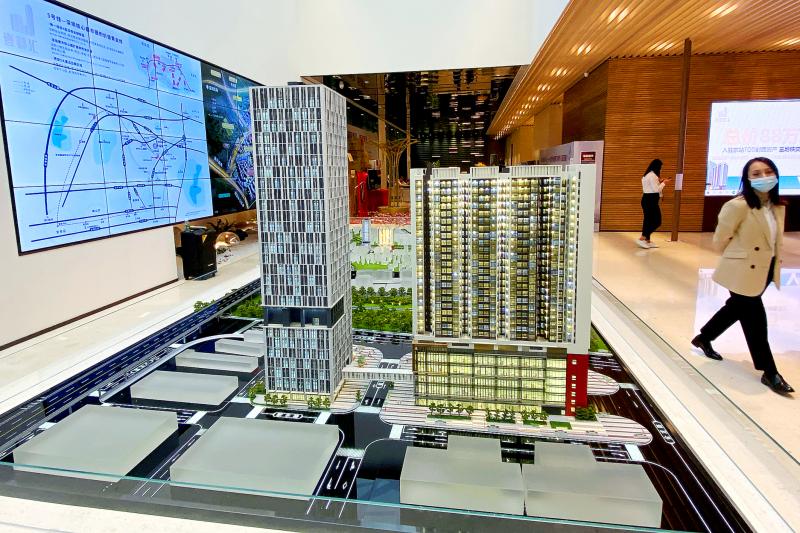The People’s Bank of China (PBOC) said it would guard against moral hazards such as greenwashing and sustainable project fraud as it expands its use of green monetary policy to drive the nation’s energy transition.
In a rare interview conducted in English with a state broadcaster, PBOC Governor Yi Gang (易綱) warned against the “greenwashing, low-cost fund arbitrage and green project fraud” that have been on the rise alongside the influx of sustainable capital in recent years.
“For fair and efficient implementation of green monetary policy tools, we should guard against different kinds of moral hazards,” Yi said. “Therefore, information disclosure and strict supervision are needed when we design and implement” these tools.

Photo: Reuters
A transcript of his interview with China Global Television Network was released on Monday by the central bank in English and Mandarin, a sign his comments were targeted toward an international audience.
As the world’s worst polluter, China has quickly pushed a chart-topping amount of private money to meet its green targets, which include peak emissions by 2030 and carbon neutrality by 2060. In just a few years, it has become one of the biggest issuers of green bonds, green loans and other financial products designed to support those policy goals.
The PBOC has wielded its green monetary tools to contribute to that push. Since November, it has lent about 210 billion yuan (US$31.4 billion) to banks at cheaper rates to help them provide more loans to firms working toward China’s carbon-reduction goals.
Meanwhile, Chinese borrowers have sold about US$56.4 billion in local and offshore environmental, social and governance, or ESG, debt this year, making it one of the fastest-growing green bond markets in the world. New green bonds in China almost doubled in the first quarter, even as the rest of the world saw a 32 percent decline.
Still, the risks of poor oversight and access to cheap credit are fresh in regulators’ minds, with the debt crisis engulfing China’s real-estate sector continuing to play out. Allowing riskier borrowers unfettered access to cheaper green debt has already resulted in defaults. Late last year, Modern Land China Co (當代置業) failed to repay a green dollar bond and Kaisa Group Holdings Ltd (佳兆業集團) skipped payment on a sustainability bond.
The PBOC will continue promoting disclosure and “strict supervision,” Yi said.
Last year, the central bank released guidelines on environmental reporting for financial institutions, including on green loan issuance. It has been piloting the program in the Greater Bay Area along with Guizhou and Chongqing in southwestern China.
The program will be expanded nationwide, Yi said.
“This year, our priority is to develop the framework for transition finance, to guide social capital to support low-carbon transition of high-emission sectors,” he said.

MULTIFACETED: A task force has analyzed possible scenarios and created responses to assist domestic industries in dealing with US tariffs, the economics minister said The Executive Yuan is tomorrow to announce countermeasures to US President Donald Trump’s planned reciprocal tariffs, although the details of the plan would not be made public until Monday next week, Minister of Economic Affairs J.W. Kuo (郭智輝) said yesterday. The Cabinet established an economic and trade task force in November last year to deal with US trade and tariff related issues, Kuo told reporters outside the legislature in Taipei. The task force has been analyzing and evaluating all kinds of scenarios to identify suitable responses and determine how best to assist domestic industries in managing the effects of Trump’s tariffs, he

TIGHT-LIPPED: UMC said it had no merger plans at the moment, after Nikkei Asia reported that the firm and GlobalFoundries were considering restarting merger talks United Microelectronics Corp (UMC, 聯電), the world’s No. 4 contract chipmaker, yesterday launched a new US$5 billion 12-inch chip factory in Singapore as part of its latest effort to diversify its manufacturing footprint amid growing geopolitical risks. The new factory, adjacent to UMC’s existing Singapore fab in the Pasir Res Wafer Fab Park, is scheduled to enter volume production next year, utilizing mature 22-nanometer and 28-nanometer process technologies, UMC said in a statement. The company plans to invest US$5 billion during the first phase of the new fab, which would have an installed capacity of 30,000 12-inch wafers per month, it said. The

Taiwan’s official purchasing managers’ index (PMI) last month rose 0.2 percentage points to 54.2, in a second consecutive month of expansion, thanks to front-loading demand intended to avoid potential US tariff hikes, the Chung-Hua Institution for Economic Research (CIER, 中華經濟研究院) said yesterday. While short-term demand appeared robust, uncertainties rose due to US President Donald Trump’s unpredictable trade policy, CIER president Lien Hsien-ming (連賢明) told a news conference in Taipei. Taiwan’s economy this year would be characterized by high-level fluctuations and the volatility would be wilder than most expect, Lien said Demand for electronics, particularly semiconductors, continues to benefit from US technology giants’ effort

‘SWASTICAR’: Tesla CEO Elon Musk’s close association with Donald Trump has prompted opponents to brand him a ‘Nazi’ and resulted in a dramatic drop in sales Demonstrators descended on Tesla Inc dealerships across the US, and in Europe and Canada on Saturday to protest company chief Elon Musk, who has amassed extraordinary power as a top adviser to US President Donald Trump. Waving signs with messages such as “Musk is stealing our money” and “Reclaim our country,” the protests largely took place peacefully following fiery episodes of vandalism on Tesla vehicles, dealerships and other facilities in recent weeks that US officials have denounced as terrorism. Hundreds rallied on Saturday outside the Tesla dealership in Manhattan. Some blasted Musk, the world’s richest man, while others demanded the shuttering of his